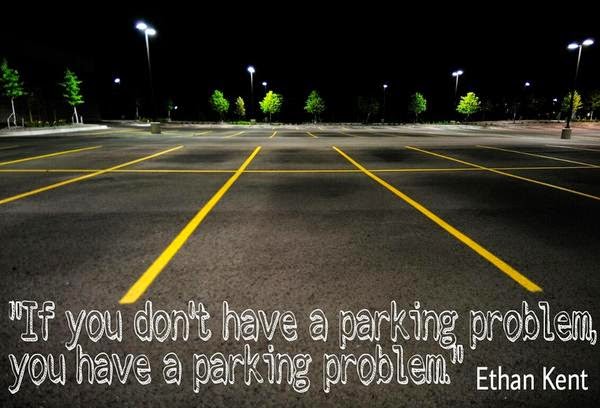If You Could Waive a Magic Wand in Your City, What Would You Change?
My boss likes to ask people this question whenever we interview someone in our office, and as I've thought about it, my answer has continually evolved over the years. I've already discussed the changes I'd like to see in the City of Lansing, but I don't think those necessarily require a magic wand. I think they're sensible suggestions that just make sense. As a result I won't include them in my "magic wand" answer. I will say, however, if another new sub shop goes into the prime real estate on the corner of Michigan and Washington Avenues, my head will explode. But I digress.
If I could wave a magic wand in the City of Lansing, I'd eliminate surface parking - seriously pretty much all of it. Street parking is great. Garage parking I can live with if there is first floor retail (and I still won't love it), but the amount of surface parking in the Downtown Lansing is out of control. There are vast tracts of land filled with asphalt and cars, and those spaces are empty after 5 pm and on the weekends. Ethan Kent of the Project for Public Spaces said, "If you don't have a parking problem, you have a parking problem." Lansing definitely does not have a parking problem. I can find a spot any time without exception. As a result Lansing definitely does have a parking problem.
Unfortunately nearly all American cities have absurd off-street parking minimums, generally designed around peak use. You can see this system in Lansing with a giant parking lot between the state buildings and the Hall of Justice (that sits empty from 5 pm to 7 am and all weekend long). That spot would be prime green space for state employees and all of us downtown to use. The result of all of these parking minimums is that all of us are paying for parking even if we're not using it. It would be much more cost effective for communities to let the market determine off-street parking need.
We should all be outraged at the cost of parking. According to Jeff Speck's Walkable City (potentially my favorite book ever), one asphalt spot in the country costs approximately $4,000 to build. An underground parking garage costs between $40,000 to $60,000 to build. Who do you think is paying for this? All of us. According to Donald Shoup, Urban Planning Guru Professor at UCLA, the cumulative parking subsidy nationwide is between $127 billion and $374 billion per year. Yes, that's billion with a B for those of you playing with home. This puts the cost of parking in the range of our national defense budget. That, my friends, is f'd up.
Okay look - if you want to live somewhere far away and have a commute have at it. But I don't think we should make it easier for people to not at least try to come up with driving alternatives. We can carpool, take the bus, ride a bike. I'm not saying every alternative is the easiest, but people aren't even forced to think about it. They can park in one of many surface parking lots that makes my downtown neighborhood look like an asphalt wasteland in the off peak hours and a car-filled no man's land during the day.
Unfortunately I don't have a magic wand, and I'll continue to walk my dogs across the empty surface parking lots nearly every morning and evening. Parking is expensive for all of us, and I think it's money that could be invested in more important things - public transit and parks for example - rather than parking. Speaking of parks I'd also like a dog park downtown. I wonder if there's a surface parking lot we can eliminate to get one?
If I could wave a magic wand in the City of Lansing, I'd eliminate surface parking - seriously pretty much all of it. Street parking is great. Garage parking I can live with if there is first floor retail (and I still won't love it), but the amount of surface parking in the Downtown Lansing is out of control. There are vast tracts of land filled with asphalt and cars, and those spaces are empty after 5 pm and on the weekends. Ethan Kent of the Project for Public Spaces said, "If you don't have a parking problem, you have a parking problem." Lansing definitely does not have a parking problem. I can find a spot any time without exception. As a result Lansing definitely does have a parking problem.
Unfortunately nearly all American cities have absurd off-street parking minimums, generally designed around peak use. You can see this system in Lansing with a giant parking lot between the state buildings and the Hall of Justice (that sits empty from 5 pm to 7 am and all weekend long). That spot would be prime green space for state employees and all of us downtown to use. The result of all of these parking minimums is that all of us are paying for parking even if we're not using it. It would be much more cost effective for communities to let the market determine off-street parking need.
We should all be outraged at the cost of parking. According to Jeff Speck's Walkable City (potentially my favorite book ever), one asphalt spot in the country costs approximately $4,000 to build. An underground parking garage costs between $40,000 to $60,000 to build. Who do you think is paying for this? All of us. According to Donald Shoup, Urban Planning Guru Professor at UCLA, the cumulative parking subsidy nationwide is between $127 billion and $374 billion per year. Yes, that's billion with a B for those of you playing with home. This puts the cost of parking in the range of our national defense budget. That, my friends, is f'd up.
Okay look - if you want to live somewhere far away and have a commute have at it. But I don't think we should make it easier for people to not at least try to come up with driving alternatives. We can carpool, take the bus, ride a bike. I'm not saying every alternative is the easiest, but people aren't even forced to think about it. They can park in one of many surface parking lots that makes my downtown neighborhood look like an asphalt wasteland in the off peak hours and a car-filled no man's land during the day.
Unfortunately I don't have a magic wand, and I'll continue to walk my dogs across the empty surface parking lots nearly every morning and evening. Parking is expensive for all of us, and I think it's money that could be invested in more important things - public transit and parks for example - rather than parking. Speaking of parks I'd also like a dog park downtown. I wonder if there's a surface parking lot we can eliminate to get one?




Comments
Post a Comment